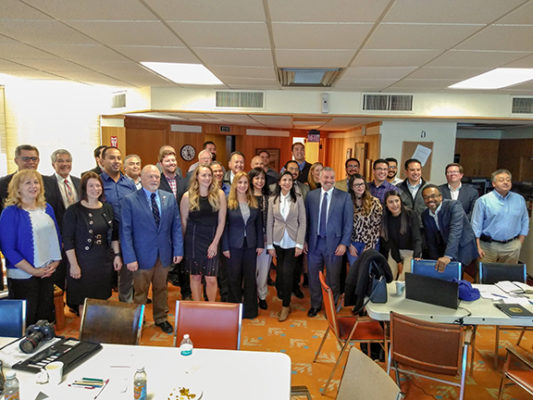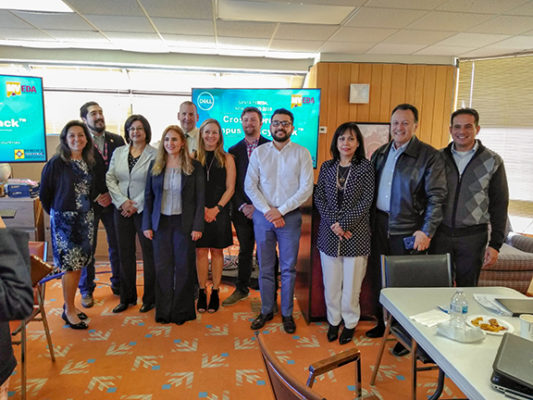SANTA TERESA — Many things can be hacked, computers, smartphones, game consoles, and that usually creates problems but a recent hackathon focused on solutions.
This hackathon doesn’t hack technology, but it hacks policies, which is what gives this event its name: PolicyHack.
“I thought it was one of the best policy hacks we’ve ever done,” said Cris Turner, head of government affairs for the Americas at Dell and a judge for PolicyHack.
Dell Inc. organizes policy hacks at sites around the world to bring together government officials, entrepreneurs, business and non-profit leaders, venture capitalists and students.
The border event included people from both the U.S. and Mexico and three states, Texas, New Mexico, Chihuahua.

Group photo of participants of PolicyHack.
“We’ve got so much turmoil going on around border issues and the solutions-oriented approach to this event really gives the opportunity to elevate a different story about the border and a story that’s being told by people that actually live and work here,” Turner said.
The people who participated in the first Dell Border Policy Hack met in Santa Teresa in early April.
“This gathering puts together our minds and all our intentions to do better. I always thought this could be the best border between Mexico and the U.S. and also the world,” said Jaime Campos, director of innovation and economic development for the state of Chihuahua.
He and others who participated in the policy hack want to build on the unique relationships and connections on both sides of the border.
The policy hack happened as President Donald Trump threatened to close the border unless Mexico did more to stop Central American migrants from trying to reach the U.S. to ask for asylum.
“The shutdown of the border cannot happen. We have good ports of entry, good Homeland Security. We really think that sometimes the people misunderstand what’s going on,” Campos said.
With everything that’s happening on the U.S.-Mexico border, the policy hack participants wanted to focus on solutions that benefit both sides while building on existing cross border relationships.
“It is important for us to keep this positive idea that we can still collaborate that we’re still a good partnership…,” said Francisco Palleres with the Economic Development Department of the City of Las Cruces.
The five teams had to answer some crucial questions about building federal and local support, academic and industry partnerships, and businesses clusters based on the region’s strengths. Each team had 75 minutes to create a 5-minute presentation. And panel of judges had five minutes to ask questions.

The two winning teams of Border PolicyHack.
The judges usually pick one winner but because everyone had such interesting proposals, they chose two teams, one focused on creating a “campus of the mind” the other a “business cluster” plan on the border.
“What’s nice in that short amount of time, the easy ideas, the most achievable ideas bubble up. So I think implementing it is doable to in a short amount of time,” said Emma Schwartz, president of the Medical Center of the Americas Foundation in El Paso. Her team won for their business cluster idea.
Dell will work with the teams over the next 18 months to come up with a plan to execute the proposals with the help of industry and government support.
“All of the teams that didn’t win, we actually decided we want to take all of your ideas and build them into the plan,” Turner said.

